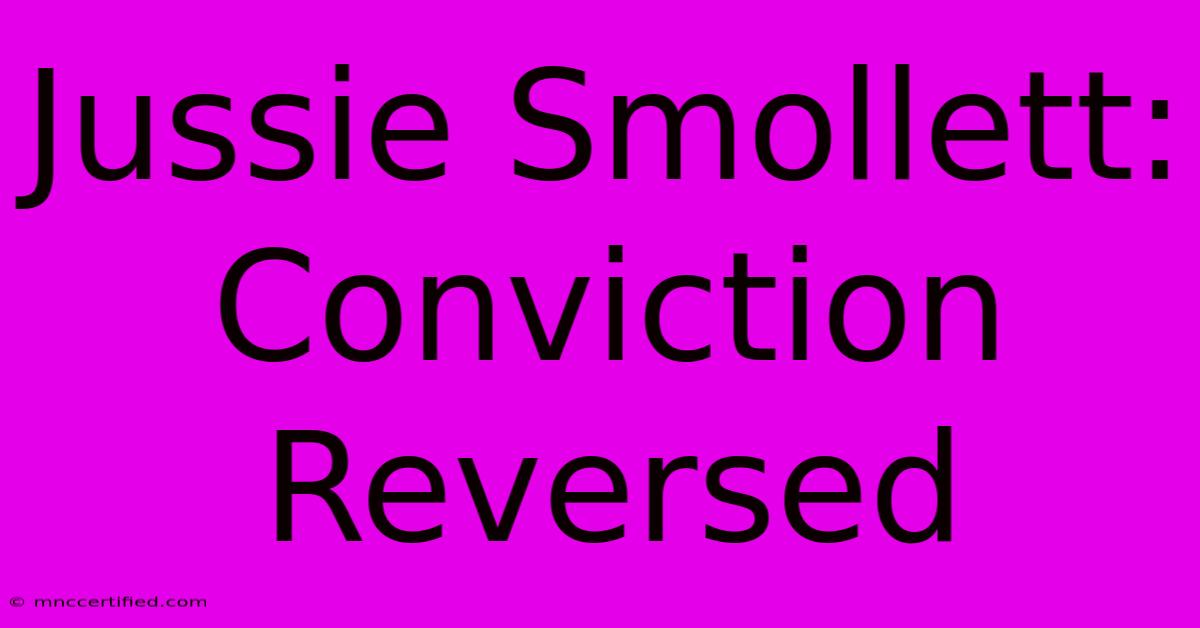Jussie Smollett: Conviction Reversed

Table of Contents
Jussie Smollett: Conviction Reversed – A Deeper Look at the Case
The case of Jussie Smollett, the actor accused and subsequently convicted of staging a hate crime against himself, has taken numerous twists and turns. In March 2022, he was found guilty on five counts of felony disorderly conduct. However, a surprising development unfolded when that conviction was reversed. This article delves into the details, exploring the reasons behind the reversal and its broader implications.
The Original Charges and Conviction
In January 2019, Smollett reported to Chicago police that he had been the victim of a racist and homophobic attack. He claimed two men, wearing MAGA hats, had assaulted him, poured bleach on him, and shouted racial and homophobic slurs. The incident garnered significant national attention, sparking outrage and fueling political discourse.
However, the investigation took a dramatic turn. Police determined that Smollett had orchestrated the entire incident, paying two brothers to stage the attack. He was subsequently charged with disorderly conduct, a felony in Illinois. The prosecution argued that Smollett, motivated by dissatisfaction with his salary on the television show Empire, fabricated the attack to garner sympathy and elevate his profile. Following a highly publicized trial, Smollett was found guilty.
The Reversal of the Conviction: Why Did It Happen?
The reversal of Smollett's conviction wasn't due to new evidence proving his innocence. Instead, it stemmed from a procedural error. The judge overseeing the case, Judge James Linn, dismissed all charges against Smollett because the prosecution failed to appoint a sufficient number of Black jurors to the jury pool. This sparked considerable debate surrounding the implications for jury selection and the fairness of the legal process. While the prosecution argued that they had made a good faith effort, the judge ultimately decided that the procedural error warranted the dismissal of the charges. This highlights the critical importance of proper jury selection procedures in ensuring a fair trial and upholding the principles of justice.
The Role of Jury Selection in the Legal Process
The Smollett case underscores the crucial role that jury selection plays in the American justice system. A fair and impartial jury is paramount to ensuring a just outcome. The judge's decision highlighted the potential consequences of neglecting proper procedures during this critical stage of the trial. The case serves as a reminder of the importance of adhering strictly to legal guidelines to prevent procedural errors that could compromise the integrity of the judicial process.
The Aftermath and Ongoing Debate
The reversal of Smollett's conviction has ignited a firestorm of debate. Some view the decision as a victory for ensuring fairness in the justice system, emphasizing the importance of adhering to proper procedures. Others criticize the judge's decision, arguing that it overshadows the seriousness of the original charges and the potential harm caused by Smollett's actions. The case raises complex questions about the balance between ensuring procedural fairness and upholding the principles of justice in high-profile cases.
Long-Term Implications and Future Legal Ramifications
The Smollett case's impact extends beyond the immediate legal ramifications. It raises important questions about the handling of hate crime allegations, the media's role in shaping public perception, and the importance of due process. The case is likely to continue to influence legal discussions and practices related to jury selection, hate crime investigations, and the balance between procedural fairness and substantive justice. The legal precedent set by this case could impact future cases with similar procedural challenges.
Conclusion: An Unresolved Narrative
The reversal of Jussie Smollett's conviction leaves a complicated legacy. While the procedural error that led to the dismissal is undeniable, the underlying facts of the case remain contentious. The incident continues to fuel debate regarding the complexities of justice, the media's role in shaping public discourse, and the importance of upholding due process while ensuring accountability. The story, though legally concluded at this point, remains an ongoing conversation about the intersection of law, media, and public perception.

Thank you for visiting our website wich cover about Jussie Smollett: Conviction Reversed. We hope the information provided has been useful to you. Feel free to contact us if you have any questions or need further assistance. See you next time and dont miss to bookmark.
Featured Posts
-
5 Star Qb Underwood Picks Michigan
Nov 22, 2024
-
Jussie Smollett Charges Dropped
Nov 22, 2024
-
A Man On The Inside Review And Analysis
Nov 22, 2024
-
Gaetz Wife Faces Online Backlash
Nov 22, 2024
-
Nashville Real Estate Investment
Nov 22, 2024